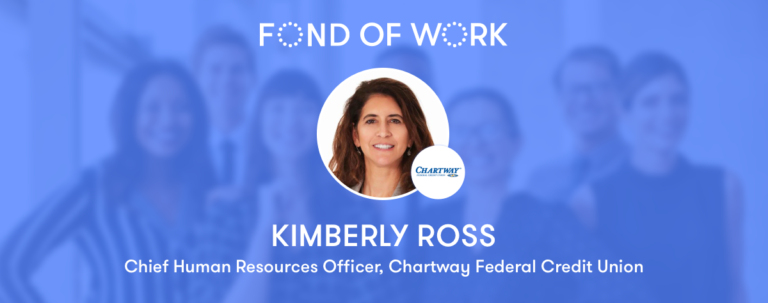
This time for Fond of Work, we speak with Kimberly Ross, CHRO at Chartway Federal Credit Union. Kimberly is a highly experienced HR leader who specializes in leading enterprise HR strategies for culture, diversity, employee engagement, compensation, and more. Learn about her journey below.
 How did you first get into the HR space?
How did you first get into the HR space?
My entry into the HR space was unplanned — I sort of fell into it. I majored in Art, minored in English and took a few business classes to ensure I could support myself coming out of college. One of my first jobs was as a bookkeeper for a restaurant company, and part of the responsibilities included benefit administration in addition to hiring and onboarding new hires. In that experience, I found a new passion. Before I knew it, I became an HR Manager and I have loved my work ever since.
How did you end up at your current position at Chartway Federal Credit Union?
I was contacted by the CEO of Chartway based on a reference from a mutual acquaintance. My background includes working for a company known for its workplace culture and was fortunate enough to be responsible for diversity, engagement and culture for that company. The CEO was seeking someone who could help with his mission to transform the culture. After my initial discussion, it was I felt compelled to become a part of the exciting changes taking place.
 Why are you fond of your work?
Why are you fond of your work?
I find my work extremely rewarding. I am afforded the opportunity to work and learn from such a wide variety of people, and in the process, get to help drive some very meaningful initiatives forward. One of the best parts of my job is that I get to dedicate a good deal of time finding ways to help people maximize their potential and thrive in the workplace through things like career pathing and individual development. Those efforts contribute to the overall health and success of the company. It’s an amazing role!
Why do you think HR is an important department for every business to have?
Similar to a CFO and the Accounting/Finance function who help create the plans and monitor the financial health of the organization, a Human Resource function is essential to sustaining the health of the workplace. At the heart of a company’s success is its ability to maintain an environment that effectively identifies talent, trains and develops that talent, and retains employees to successfully move the business forward. The function of Human Resources provides the specialized capability for establishing strategic “people” plans — plans that are critical for ensuring that the right skills, capabilities, organizational structures, and ethical guideposts are in place for the current and future success of the company.
 What’s your management philosophy? How do you apply it at your company?
What’s your management philosophy? How do you apply it at your company?
My leadership philosophy tends to follow the “servant leader” concept. I feel that one of the most important aspects of leadership is that of support, that is taking care of each member of each team by providing clear expectations, encouraging and listening to feedback for continuous improvement, investing in individual development, and sharing and celebrating successes. At Chartway, we build our programs, processes, and tools to enable our management teams to lead in this fashion, ensuring clear expectations through the development of competency models, incorporating frequent observation and performance feedback sessions, and constructing development plans unique to individual needs through collaboration.
How do you keep company core values front-of-mind for your team?
Company core values are the litmus test by which decisions are made and the baseline for how things are done at Chartway. When structuring initiatives, processes and programs, my team and I evaluate the concepts against our core values, ensuring that what is instituted is aligned. We also frequently collaborate, questioning ourselves to ensure our decisions and our policies are aligned with the intent of our core values.
 Why do you think employee recognition matters?
Why do you think employee recognition matters?
Employee recognition is the “magic sauce” that fuels performance and the compass that helps people know they are doing the “right” thing — the thing that is expected and valued.
Employees are human, and all humans need to feel a sense of purpose – to know that they are valued and add value. While not really “magic,” it is incredibly powerful to recognize someone for the value they contribute. Sure, people can be asked to do things without being told they are doing a good job. They may still continue you to do those things … for a while. And then they’ll get to a point where they no longer add value because their heart isn’t in the work. If you want a high-performance workplace — one where people care, think critically, save the company time and money, and perform well consistently, you need recognition.
What’s the best advice you’ve received in your career?
The best advice that I received in my career was a reminder to consider the perspective of others first. When young in my career, wanting to “prove” myself, there were times I was trying to convince others of why my idea would work or why it was important. I’m certain there are still times I do that, however, I try to pause before trying to convince others. That pause allows me to consider the other person’s perspective by asking about his/her concerns or about the things that are important to him/her instead of focusing on my perspective so rigidly. That advice has proven very effective for me throughout my working career as well as my personal interactions. I have been more effective influencing and collaborating to drive change practicing that one concept. I have also shared that advice with others who have shared that has been valuable to them as well.
What are some of the most pressing issues HR leaders face today?
In my opinion, HR faces challenges in two areas:
- Solving for talent shortages — while talent shortages are even more of a challenge with historical low unemployment, I think that HR will continue to be challenged with talent shortages due to the ever-evolving specialized skills resulting from both the fast-paced advancements in technology and (depending on your industry) the decrease of skilled workers in “trade” areas.
- The other pressing issue HR Leaders face is the ongoing challenge to keep HR systems and programs relevant and user-friendly. Obtaining the necessary investments, whether building, renting or buying, is often difficult to secure and with the ever-changing needs of an organization. It can be difficult to avoid outdated, fragmented HR processes that lend to manual, ineffective work for the HR team and its end-users.
 What’s one thing you’ve had to learn the hard way in your career?
What’s one thing you’ve had to learn the hard way in your career?
The best way to say “no” without saying “no.” Getting a seat at the table and serving as a strategic business partner can sometimes be mistaken for acquiescing to all requests — showing that you are a team player, willing to pitch in and take on more for the betterment of the company. It took me a few times to start realizing that my reaction to jump to take things on did not include a clear assessment of the downstream impact to the team or whether it was even in the best interest of the company. After a few times of adding work to the team to help out another team, I learned the value of analyzing requests objectively — better understanding the overall impact of taking on additional work — when the team was at capacity. Now, my response to requests is still not a “no,” but instead a more thoughtful “I’d be happy to help, but let’s discuss the impact of adding this work into the existing workload to determine what, if anything may need to be delayed, removed, or otherwise transitioned to another area to ensure we don’t risk the success of this or any of our other commitments.”
Any advice for future HR leaders?
My advice for future HR leaders is pretty basic: learn how to manage time and prioritize effectively. That includes scheduling time for “thinking” and building strategy to avoid getting caught up in a constant state of transactional management and only working on things that drain you of your positive energy. To be a strong and strategic partner, remember to understand the needs of the business from your leadership team and always base the HR strategy on the business strategy. That can be difficult when you can see, as the HR professional, the vast array of people needs that company may have to tackle. While you may think it’s important, unless it helps drive the company initiatives, it may not be viewed as important by any of your peers or senior leadership. Your ability to be “heard” can be diminished.
Thanks so much to Kimberly for taking the time to speak with us for Fond of Work. Stay tuned for the next interview in the Fond of Work series, coming soon! By the way, Chartway Federal Credit Union is hiring, so check out their website to view their open positions.
Fond is a global SaaS platform that seamlessly consolidates employee rewards and recognition processes into one easy-to-use solution. For more information on how Fond can help you, request a demo today!
 How did you first get into the HR space?
How did you first get into the HR space? Why are you fond of your work?
Why are you fond of your work? What’s your management philosophy? How do you apply it at your company?
What’s your management philosophy? How do you apply it at your company? Why do you think employee recognition matters?
Why do you think employee recognition matters? What’s one thing you’ve had to learn the hard way in your career?
What’s one thing you’ve had to learn the hard way in your career?